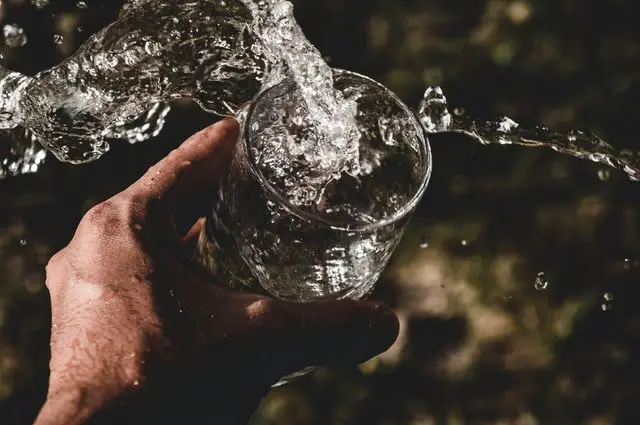The short answer: If you used your vacuum cleaner to suck up water, the vacuum cleaner, if it’s not a ‘wet vac’ will end up malfunctioning, the motor would seize/burn out and you would possibly see smoke if you continued to suck up water regularly, these would be the least of your worries too, in some occasions you run the risk of electrocution.
Normal, traditional type vacuum cleaners are not built to suck up water unfortunately, in some situations, using a canister type vacuum, you may get away with it if the spillage is not severe but for regular water extraction, you would be better off purchasing a wet vac unit.
What happens if I vacuum up water?
Generally, if a vacuum sucks up a little moisture/liquid, no damage would be caused to it, especially if you remove the filter first.
By removing the filter, you prevent it from becoming wet, if the filter becomes wet, the next time you use the vacuum cleaner the filter will be damp and it will get blocked simply because of the dust becoming wet and when dust becomes moist, it turns into a slushy slodge.
So if you really need to vacuum up water, make sure to remove the filter so there is a clear path for the liquid to go into the vacuum chamber.
Can you use a vacuum to pick up water?
If you have a wet vac type vacuum cleaner, then yes, these types of vacuums are designed to pick up or “extract” water from floors, surfaces and carpets, however, normal traditional vacuum cleaners, although can suck up water, shouldn’t be depended on for large extraction jobs.
If you are using a canister type vacuum cleaner such as a Henry , you might be able to get away with sucking up water safely, if you remove the filter first, but do this at your own risk and do not use it in this way for long periods of time as it could damage your vacuum cleaners’ motor.
Can you get electrocuted by vacuuming water?
There is a small chance of being electrocuted when using a non “wet vac” cleaner to extract water, this is simply because normal vacuum cleaners aren’t specifically designed for this purpose, wet vac models on the other hand are designed for water usage and extraction, the insides of the machine are water-proofed/resistant, therefore no water can infiltrate any components inside the unit.
Getting water or liquids into any type of electronics can be dangerous so please take caution if you are attempting to use your vacuum cleaner to suck up water and as mentioned, this will most likely void any warranties and could potentially be very dangerous.
How do you suck water up with a vacuum cleaner?
In order to suck water up with a vacuum cleaner, generally you would want/need a wet vac, if your surface is tile or hardwood, turn on your wet vacuum and slowly go over the surface with your vacuum, do this in slow motions, by doing so, you make sure that the liquid is properly extracted from the floor otherwise vigorous motions can lead to surfaces not being extracted enough, so make sure you go back and forth in slow repetitive motions.
If your surface is carpet of upholstery, you will need to go back and forth over the area a number of times as water will need to thoroughly be extracted from the fibers within the material, if not, you will start to smell a musky or damp smell in the area, so keep going over the affected area until the surface is completely touch dry, you can press the carpet with your hand to see if any liquid or moisture is left and if you feel that is it still wet, give it a few more passes.
Will sucking up water ruin a household vacuum cleaner?
Sucking up water with a household vacuum cleaner may indeed ruin it, however, if you minimize the risk involved, by removing the air filter and making sure there are no blockages from the hose to the bin container, using a household vacuum cleaner in short bursts, can be effective with minimal damages but do this at your own risk.
Normally, wet vacs have extra power or a water extraction boost mode, more suction is needed as water is heavier than dust and debris, so even if your household vacuum cleaner doesn’t go out with a bang, it will be less effective at sucking up water than a wet vac would.
What is the best wet vac?
If you need a vacuum cleaner to suck up water regularly, we recommend purchasing a wet vac, they are not very expensive and at least you know you will not be putting your household vacuum cleaner at risk of damage.
There are various well known brands that specialize in extracting water, we very much recommend these models below.
Conclusion
What Would Happen if You Used Your Vacuum Cleaner to Suck up Water? Well, one of two things ‘could’ happen, either nothing, and your vacuum cleaner will live another day to tell the tale or… it could go up in a heap of smoke.
No one can truly give you a definitive answer to this, it very much depends on many variables, such as…
– How long are you using it for water extraction?
– How much water is being sucked up?
– Have you removed the air filter before you sucked up water?
– Has the water infiltrated the vacuum cleaners internals?
Making sure that you remove the air filter and only use it for short bursts should limit any damages to the machine but it isn’t recommended to use a household vacuuum cleaner to suck up water. Be careful.





